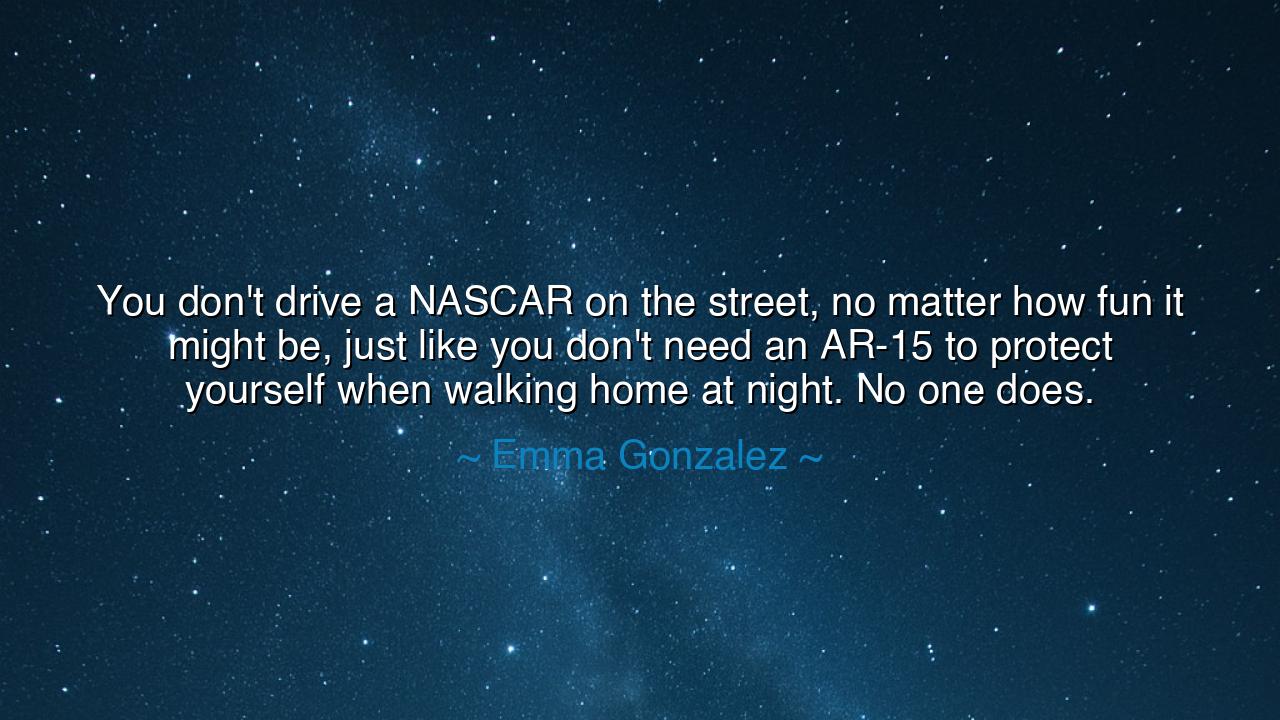
You don't drive a NASCAR on the street, no matter how fun it
You don't drive a NASCAR on the street, no matter how fun it might be, just like you don't need an AR-15 to protect yourself when walking home at night. No one does.






“You don’t drive a NASCAR on the street, no matter how fun it might be, just like you don’t need an AR-15 to protect yourself when walking home at night. No one does.” Thus spoke Emma González, a young voice forged in the fire of tragedy, yet tempered with wisdom far beyond her years. These words, born from the ashes of loss, carry not only the cry of sorrow but the clarion call of reason. Her statement is not merely about weaponry — it is about balance, about the eternal struggle between power and responsibility. It is a reminder that strength, when unrestrained by wisdom, becomes destruction; that the tools forged for war must not be mistaken for the instruments of peace.
In this quote, González invokes two symbols — the NASCAR and the AR-15 — both creations of human ingenuity, both capable of awe, both dangerous when misplaced. The race car, built for the controlled fury of the track, is wondrous when guided by purpose and precision, but disastrous on the open road. So too the rifle, built for battle, demands discipline, control, and the gravity of necessity. Her comparison is a work of moral engineering — simple, vivid, and piercing. It teaches that context gives meaning to power, and that what is suited to one arena becomes madness in another. For when instruments of war are brought into the spaces of everyday life, chaos walks hand in hand with fear.
The origin of González’s words lies in pain — in the aftermath of the Parkland school shooting, where lives were stolen by the misuse of such power. From that wound rose not despair, but defiance — a generation’s vow to question the values of those who confuse freedom with recklessness. Like the prophets of old who turned grief into action, González transformed her sorrow into a moral voice that thundered through a divided nation. Her words, uttered not from hatred but from love — love of life, love of safety, love of reason — remind us that civilization is not the unbridled exercise of rights, but the measured stewardship of them.
History, too, is filled with those who warned of the dangers of power unrestrained. The ancient Greeks told of Icarus, who, drunk on the thrill of flight, soared too close to the sun and fell into the sea. His wings were marvelous, but his wisdom was lacking. So too did Rome, the greatest empire of its age, fall not from weakness but from the overreach of its own might. González’s warning belongs to this same lineage: she speaks to a people dazzled by their own inventions, urging them to remember that mastery over tools must always be accompanied by mastery over the self.
Her words are also a call to common sense, a virtue as old as civilization itself. The wise have always known that prudence, not excess, preserves peace. When the farmer carries his plow into the field, it is good; when he wields it in anger, it is ruin. When the warrior carries his blade into battle, it is duty; when he brings it home among children, it is folly. The same principle governs all human creation — from chariots to cannons, from fire to firearms. The problem, as González reminds us, is not the existence of these tools, but the confusion of their purpose.
Consider the story of King Ashoka of India. Once a conqueror, he waged war with unmatched ferocity, but when he saw the suffering his power had wrought, he laid down his sword and took up the path of compassion. His empire endured, not through the fear of arms, but through the strength of peace. González’s quote carries that same spirit: she does not cry for weakness, but for wisdom — for a society strong enough to defend itself through restraint rather than through escalation. Her voice, like Ashoka’s, calls for transformation — for humanity to rise above its own impulses and wield its strength with conscience.
Thus, my listener, the lesson is clear and timeless: power without purpose is peril. Whether it be the power of weapon, wealth, or word, all must be guided by understanding. To carry tools meant for battle into the spaces of peace is to invite destruction upon both self and neighbor. Let us then learn from González — to choose moderation over madness, reason over reaction, and the courage of restraint over the chaos of indulgence.
And so, if you would walk safely through this world, remember this: true strength is not in what you can wield, but in what you can lay aside. The warrior of wisdom fights not to conquer, but to protect; not to display might, but to preserve life. Emma González, in her youthful clarity, teaches us that civilization depends not on the tools we build, but on the wisdom with which we use them — and that the measure of humanity is not in its power to destroy, but in its will to safeguard peace.






AAdministratorAdministrator
Welcome, honored guests. Please leave a comment, we will respond soon